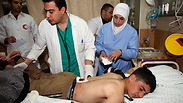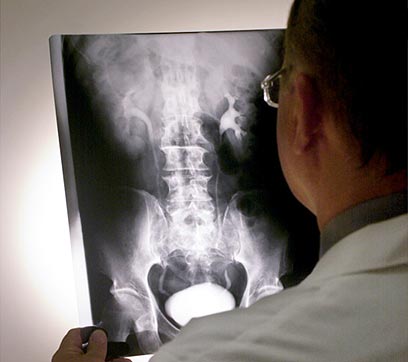
Israelis live 10 years longer than Palestinians
Physicians for Human Rights report finds Israel spends 10 times as much money on healthcare as PA does. 'It is up to Israel to provide equal medical treatment to Palestinians,' report's author says.
These are the results of a new report by Physicians for Human Rights in Israel, which says that Israel continues to bear responsibility for the healthcare situation of Palestinians as long as it controls areas that Israel acquired in 1967.
"The report is not only about the numbers, but our demand for equality,” Mor Efrat, the report's author, told The Media Line. "We can no longer treat the occupation as we used to. Because the occupation is so long and deep, it is up to Israel to give equal medical treatment to Israelis and Palestinians."
Many Palestinian hospitals lack sophisticated equipment such as PET-CT scanner, used to detect cancer and other illnesses. While this machine is routine in Israeli hospitals, no Palestinian hospital or clinic has one. Any patient needing this kind of scan needs to put in a request, which must be approved by Israel.
Each year, Efrat says, more than 200,000 Palestinians request Israeli permission to leave the West Bank or Gaza Strip. In about one-fifth of those cases, the permission is denied.
Israeli officials say they make every effort to help Palestinians obtain the medical treatment they need, working closely with the Palestinian Authority to facilitate the transfer of ill Palestinians. The Palestinian Authority pays for their treatment in Israeli hospitals.

Palestinian healthcare in the Gaza Strip, where 1.8 million Palestinians live, is significantly worse than in the West Bank. There are 13 government hospitals, but many lack basic equipment and medicine. Because of an ongoing crisis between the Hamas movement in Gaza, and the Palestinian Authority in the West Bank, most Palestinian civil servants in Gaza have not received salaries for several months.
"We are facing a real disaster and that is because we do not have enough fuel for our hospitals," Dr. Medhet Abbas, the director general of the Palestinian Ministry of Health in Gaza told The Media Line. "We could run out of fuel in two or three days and many patients will suffer."
He said that Palestinians living in Gaza are facing a health crisis. The only two exits from Gaza are to Israel and to Egypt, which is often closed. It can take weeks or even months to get permits to travel to Israel for medical care. Patients often must be interviewed by Israeli intelligence which tries to convince them to offer information. Some patients forgo medical care, afraid they could be labeled a “collaborator” with Israel.
He said that Gaza is still suffering from the effects of last summer’s heavy fighting with Israel, in which almost 2200 Palestinians were killed.
Thousands of Palestinians are still living in improvised housing, and the reconstruction of damaged homes has barely begun. The region is currently in the throes of a cold front, and at least four Gazans, two of them babies, have died from the cold, he said.
The Physicians for Human Rights reports compared a series of indicators of health in both populations. Palestinian male life expectancy is 71 (compared to 79.9 for Israeli men), while Palestinian women live on average 73.9 versus 83.6 for Israeli women. In the West Bank and Gaza, the infant mortality rate is 18.8 deaths per 1000 births, while in Israel it is 3.7, among the lowest in the world. Israel also spends over $2000 per person per year for healthcare, while Palestinians spend just $248 per capita.
As a result of the 1993 Oslo Accords, the Palestinian Authority has its own Health Ministry, responsible for all health issues. However, Efrat says that Israel controls freedom of movement, and the import of all medical supplies into the West Bank and Gaza.
Israel also decides on how many medical personnel can work in east Jerusalem, which Israel annexed in 1967, where six of the Palestinian hospitals are located. Israel also does not allow Palestinian hospitals to buy medicine from the Arab world, where it would be cheaper than to buy it from Israel.
"As long as Israel uses mechanisms to control the Palestinian medical system, it has a responsibility for equal treatment for Palestinians," Efrat said.
Article written by Linda Gradstein.
Reprinted with permission from The Media Line.










